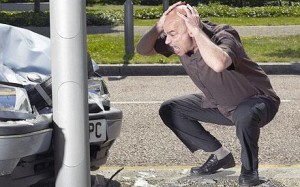Understanding Collision Insurance
When it comes to auto insurance the type of coverages you need to have are largely regulated by state laws and also the terms of an auto loan, if applicable. Since cars are quite expensive most people have to take out a loan to buy a new or used car. These loans generally mandate that you have to buy collision and comprehensive coverage, in addition to the liability coverage which is mandated by state law. While you may not have a lot of choice when it comes down to what type of coverage you choose for your vehicle, it is helpful to understand what is covered by these policies.
What does Collision Insurance cover? 
Since you are required to have this type of coverage if you have an auto loan it is helpful to understand exactly what this covers. The simple explanation is that collision insurance will pay for any damage to your vehicle that occurs while the vehicle is in motion. If your vehicle is parked on the side of the road and a rock hits the vehicle causing damage, this would not be covered under collision, but if you had comprehensive it would fall under that coverage. It is also a good idea to read your policy carefully and especially the exclusions section. Under any policy there are certain things that can result in coverage being denied and these are found in the exclusions section. For example, most auto insurance policies will not cover damages resulting from street racing, or if you are using your vehicle for work purposes.
Why Should I buy Collision Insurance?
The obvious answer is because it is required but even if this is not the case – it is generally a good idea to have this type of auto insurance coverage. Collision insurance provides a safety net to pay for expensive repairs that are a result of an accident. If you are at fault in an accident the coverage will pay for repairs. If another party is at fault you can choose to have your coverage pay for it or deal directly with the responsible parties insurance carrier. If your collision coverage pays for damage that was caused by another driver, your insurance company will seek reimbursement from the other insurance company. This is what is referred to as subrogation and is a term you will commonly see in most insurance policy language.
What does Collision Insurance not cover?
The specifics of what is covered under any insurance policy can be found in the policy language and can differ from one insurer to another. While some insurance companies utilize standard insurance policies that are used throughout the industry, other insurers will develop and use their own policy. This is a practice which is generally only used by the really large insurance companies. Some common items that will not be paid for under a collision claim would be any personal property inside the vehicle such as a laptop, portable electronics, etc. A good rule of thumb to use to figure out what is covered by collision is as follows. If you were to cut the roof off from your car, pick up your car, turn it upside down, and shake it, the items that fall out are not covered and anything that stays in is covered. This is a basic guideline and again, each policy is different so what is covered will depend precisely on the policy language.











